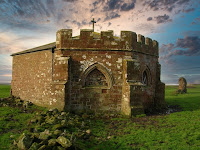The Brooke Window
The Brooke Window
The visitor walking along the landing of the west wing of Astley Hall will find the stained glass window overlooking the internal courtyard. A stained glass window that was thought to have been brought to Astley when Richard Brooke married Margaret the Charnock heiress.
The religious imagery leads you to believe that the older, coloured pieces of glass, were brought from Norton Priory that the family had purchased following the dissolution of the monasteries in the time King Henry VIII.
In the top left and right corners the diamond shaped pieces of glass contain the letters, IHS representing the first three letters of the name of Jesus in Greek capital letters, ΙΗΣ. More fully ΙΗΣΟΥΣ or Ιησους.
These are also incorporated in the symbols of the Jesuits, The Society of Jesus
|
|
The window is dated 1600 and below this can be seen the image of a badger though it often mistaken for a boar.
Brooke (Norton Priory, co. Chester, bart.) Or, a cross engr. per pale gu. and sa. Crest - A brock or badger ppr. Motto - Faste without fraude.
In modern English this can be be written as, the Arms of the Brooke family of Norton Priory in the County of Chester are a gold shield bearing a cross with wavy edge divided from top to bottom coloured red on the left and black on the right.
The crest is a brock, the old name for a badger, with lifelike colouring.
 |
| My interpretation of blazon using Armorial Gold |
In modern English this can be be written as, the Arms of the Brooke family of Norton Priory in the County of Chester are a gold shield bearing a cross with wavy edge divided from top to bottom coloured red on the left and black on the right.
The crest is a brock, the old name for a badger, with lifelike colouring.
The motto may be derived from Edmund Spenser's poem 'The Shepeardes Calendar' written in 1579.
The poem was written in the form of a twelve month calendar and this line appears in the month of May.
The Latin motto reads COGITA TECUM, perhaps an extract from the Latin Vulgate Bible commonly used in the 16th century. Cogita tecum are the first two words words of the following extract from Chapter 7 in the Gospel of St. Matthew.
Cogita tecum, fortasse vitium de quo quereris, si te diligenter excusseris, in sinu invenies; inique publico irasceris crimini tuo
meaning
Reflect that perhaps the fault of which you complain, might, on a strict examination, be discovered in yourself; and that it would be unjust publicly to express indignation against your own crime
Talks about Astley Hall….its park and its people are available to community groups with 10 miles of the Hall. To enquire use the contact form mentioning the organisation, meeting place, time of meeting and some suggested dates.
Your comments on this blog are always appreciated, particularly if I have made any mistakes.
The Hall is now closed until the completion
of the Conservation Project
Talks about Astley Hall….its park and its people are available to community groups with 10 miles of the Hall. To enquire use the contact form mentioning the organisation, meeting place, time of meeting and some suggested dates.
Your comments on this blog are always appreciated, particularly if I have made any mistakes.
You can support the work of the Friends of Astley Hall by making a donation from your phone:
Text Astley 1 to 70085 to donate £1
Text Astley 2 to 70085 to donate £2
Text Astley 5 to 70085 to donate £5
or any amount you may choose
Thank you so much for your help






Comments
Post a Comment